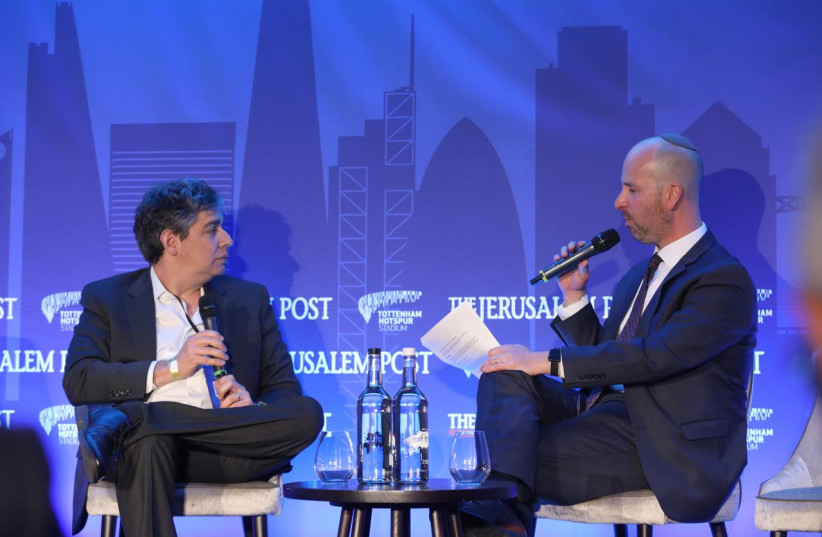Tomorrow’s wars might be fought with fewer guns, words and ideas, but with more malicious code, Nir Zuk, founder and CTO of cybersecurity company Palo Alto Networks, told the Jerusalem Post London Conference, where he discussed the future of cyberwarfare, and the increasing importance of cybersecurity.
In a world with more and more cyber threats, there is a large dependence on cybersecurity companies to understand upcoming trends in the cyber field and know how to tackle them.
For more interviews and panels from The Jerusalem Post London conference, click here >>
“It’s a cat and mouse game of good versus evil,” said Zuk. “It’s becoming more and more prominent because we have more and more devices, and also it pays off more and more to be a cyber criminal. It’s very lucrative. Most of the activities are being done from countries where there is no downside to being a cyber criminal.”
As cyber threats evolve and proliferate, there is growing concern that these attacks – unlike many which take place in physical space – are less likely to consider standard rules of war. When asked if there is a way to regulate cyberwarfare in this regard, Zuk said, “It has to be at the government level and it has to be done by governments that are willing to go the steps that are needed to do that.”
As far as the cybersecurity industry is concerned, however, the evolution of cyberwarfare is a net positive.

“Cybersecurity used to be seen as a nuisance; as a cost of doing business. I think that’s somewhat changing, certainly on the board level. Boards have started putting pressure on the organizations that they govern to do things right,” he said.
“I think cybersecurity expenditure is going up as a percentage of revenues or a specific percentage of IT expenditure, and I think that awareness is going up because of [the developments] we’re seeing. I think there are some governing laws in different countries that [penalize] companies that get hacked, and that forces companies to spend money in order to get to a position where they’re happy.”
Zuk concluded with his thoughts on the future of global warfare, and cyberspace’s increasing involvement in future conflicts.
“It probably shouldn’t surprise anyone that it’s going to continue to be part of wars, and probably an increasing part of wars. Sometimes it’s the easiest way to inflict damage on the other side, and we’re going to see more and more of that.”
That said, he continued, there are steps that can be taken to ensure a safer future.
“I think there needs to be more spending on cybersecurity. I think that we should find a way to do cybersecurity in public organizations, without letting politics interfere,” said Zuk. “God forbid there is a war and critical infrastructure gets attacked. We need to figure out ways to take those things out of the equation, and start being very practical and very concrete about how we do cybersecurity.”
Tomorrow’s wars may be fought with less guns, words and ideas, and with more malicious code. Nir Zuk, founder and CTO of cybersecurity company Palo Alto Networks, attended the Jerusalem Post London Conference, where he discussed the future of cyber warfare, and the increasing importance of cybersecurity.
In a world with more and more cyber threats, there is a large dependence on cybersecurity companies to understand upcoming trends in the cyber field and know how to tackle them. “It's a cat and mouse game of good versus evil,” said Zuk. “It’s becoming more and more prominent because we have more and more devices, and also it pays off more and more to be a cyber-criminal. It's very lucrative, most of the activities are being done from countries where there is no downside to being a cyber-criminal.”
As cyber threats evolve and proliferate, there is growing concern that these attacks - unlike many which take place in physical space - are less likely to consider standard rules of war. When asked if there is a way to regulate cyber warfare in this regard, Zuk responded that “it has to be at the government level and it has to be done by governments that are willing to go the steps that are needed to do that.”
As far as the cybersecurity industry is concerned, however, the evolution of cyber warfare is a net positive. “Cybersecurity used to be seen as a nuisance; as a cost of doing business. I think that's somewhat changing, certainly on the board level: boards have started putting pressure on the organizations that they govern to do things right,” he said.
He continued: “I think cybersecurity expenditure is going up as a percentage of revenues or a specific percentage of IT expenditure, and I think that awareness is going up because of [the developments] we're seeing. I think there are some governing laws in different countries that [penalize] companies that get hacked, and that forces companies to spend money in order to get to a position where they're happy.”
Zuk concluded with his thoughts on the future of global warfare, and cyberspace’s increasing involvement in future conflicts. “It probably shouldn't surprise anyone that it's going to continue to be part of wars, and probably an increasing part of wars. Sometimes it's the easiest way to inflict damage on the other side, and we're going to see more and more of that.”
That said, there are steps that can be taken to ensure a safer future. “I think there needs to be more spending on cybersecurity. I think that we should find a way to do cybersecurity in public organizations, without letting politics interfere,” said Zuk. “God forbid there is a war and critical infrastructure gets attacked - we need to figure out ways to take those things out of the equation, and start being very practical and very concrete about how we do cybersecurity.”
